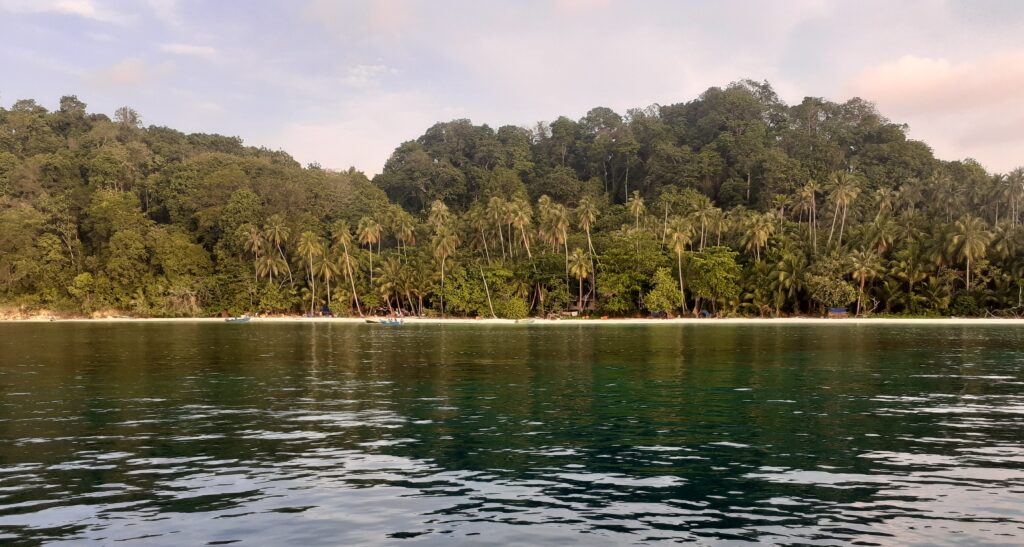There is an island in Indonesia that the charts call Sabuda but which the locals all call Pulau Pisang – Banana Island. It is only a few degrees south of the equator and is like the story book tropical island. Palm trees grow behind the white beaches and the entire island is fringed with beautiful but dangerous coral reefs. Between the coral there is one small patch of sand on the north side that is shallow enough to anchor in if the weather is settled and the wind is in the correct direction. If you decide not to anchor it is another day or two of sailing before you reach the next anchorage.

After a night at sea we rounded the headland and found a fisherman’s camp set up behind the beach and their boats pulled up on the sand. We very gingerly nosed in between the reef’s arms with Heidi at the bow “coral spotting” and dropped anchor in exactly the right spot. We jumped into the water to see if the anchor was properly set but, despite the clear water, twenty meters was just too deep to see anything. At least we had a refreshing swim.
During the afternoon fishing boats passed us and we waved to each other and called greetings across the bay. We watched the sun set and the stars appear and baked homemade bread and cheese to go with it. Life on Island time is not very stressful.
The next morning we sat in the cockpit and watched the tide come in and slowly cover the reef. It took about two hours and two cups of coffee but someone has to check that the sun and moon are doing their jobs. Once we were sure that the tides were working as expected we did an hours work to pay the bills and then set off to the beach.

We had brought a frisbee with us and started playing with the children on the beach. We were soon joined by a lady named Fiorika and the young men who all wanted to try this new game. Once we had passed round a packet of crisps, we were firm friends with half the village and went off to explore along the beach with Fiorika and the children. On our return we were invited to the camp to meet the patriarch and the rest of the family and drink coffee. There was music playing so the coffee turned into karaoke with a little dancing as we learned that this was an extended family group that came across from Fakfak for a month at a time to harvest coconuts and fish.
Someone suggested a trip to a neighboring beach to collect coconuts and within minutes about five young men, Fiorika, her sister Nona and we were in a long boat carving along the coast, around coral outcrops and under overhanging trees. I guess you can take the direct route but that would not be anywhere near as impressive when you have two “tourists” along for the ride. At the beach we were astounded as Dandi (the third son of the family and Fiorika’s husband) shinned up a massive palm tree faster than any monkey and began to throw coconuts down. The coconuts were opened but had no juice in them so we continued to the next beach for a repeat performance and some swimming. Dandi is not only a monkey, he is also a fish and can sit on the bottom of the bay for minutes at a time. He is 23 years old so thoroughly enjoyed showing off his abilities to such an appreciative audience.

Back at the bay we agreed that we would all meet for a beach fire at nine in the evening. We asked if anyone would like to see Artemis and half the village took us up on the offer. We showed them our home, the water maker, our charts with the satellite images switched on and other toys but what really impressed these fishermen was the monitor windvane. They were fascinated at the idea of a device that steered the boat even if you were asleep. They left after about an hour and that gave us time for another swim and to prepare home made pizza to take with us.
Back on the beach there were thousands of stars and only one anchor light in the bay. A small fire was burning and next to it was a huge bonfire carefully laid. As the guests of honor “Aunty and Uncle” were invited to light the fire which we did following clear instructions about exactly where to poke our fire stick.

Heidi and Fiorika opened the dancing and soon most people were dancing and enjoying this night when different cultures met. Sadly the people told us that boats often stop but the white people mostly stay on board and they never have the interaction that they had with us. Why sail the world and not talk to the people that you see around you?
Luckily Neill was the oldest person present – even older than “Grandfather” – so at eleven he could explain that he needed sleep. Everyone escorted us to our dinghy, carried it into the sea and wished us selamat Malam – good night. It was good that we left as Heidi reported that the fire was still burning bright at three o’clock.
The next morning we awoke to a breeze from the south so, after cleaning the hull as an excuse for another swim, lifted anchor and shouted a loud goodbye. As we turned downwind our friends were waving from the forest edge, one holding the yellow frisbee we had left behind.


What a lovely story.